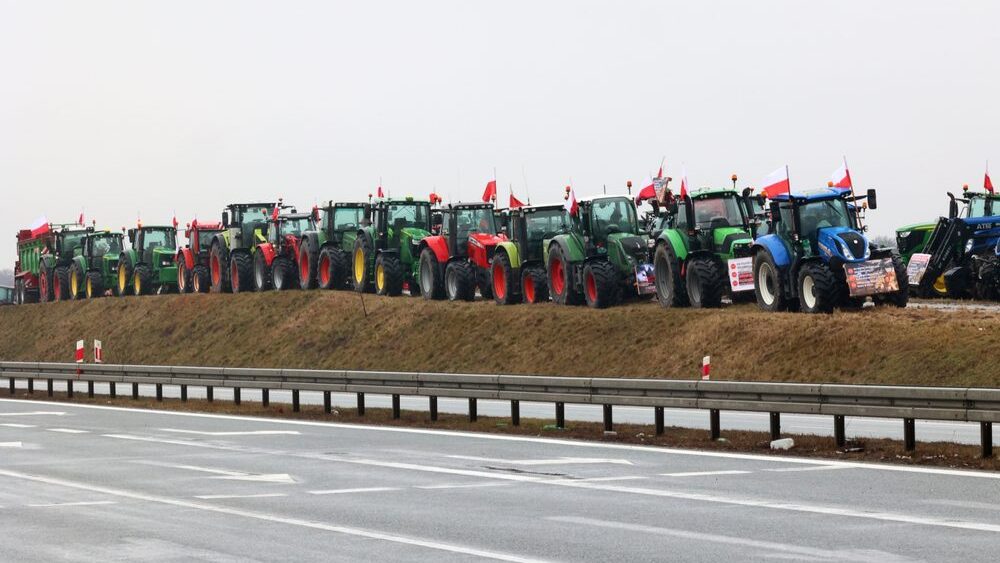No products in the cart.

Protesting farmers in Wroclaw, Poland
Photo: DarSzach / Shutterstock.com
Token concessions by the EU Commission and national governments have not subdued Europe’s rising tide of protests from the agrarian sector as farmers from across the continent continued massive protests against policies creating an existential crisis for European agriculture.
Across Europe, farmer protests are only picking up steam. French farmers have come to the support of construction companies continuing an over two-week blockade of a strategically important oil depot. Dutch fishermen showed up to support farmers, shooting off emergency flares on the dock by their fishing vessels. Belgian farmers have targeted food warehouses, while, in England, tractors conducted a go-slow demonstration near the Port of Dover against the prospect of future free trade deals by the post-Brexit UK government. Farmers have also staged protests in Moldova, Slovenia, Slovakia, and a number of other European countries.
UPDATE
— PeterSweden (@PeterSweden7) February 11, 2024
Countrie that have now joined the farmers protest:
Netherlands
Scotland
France
Germany
Poland
Lithuania
Romania
Belgium
Greece
Spain
Italy
Portugal
Ireland
Bulgaria
Britain
Wales
Moldova
Say NO to Net Zero.
In Rome, farmers rolled back a planned large presence in fear of losing their currently strong public support, opting instead for a smaller symbolic manifestation in front of the Colosseum. The Italian government of Giorgia Meloni promised to partially reintroduce a tax break on struggling farmers in the face of the protests. Italian farmers have raised concerns about rising production costs, prohibitive ‘green’ EU policies, and also competition from cheap North African imports.
Italian farmers head to Rome in tractor convoy as anger spreads
— Camus (@newstart_2024) February 7, 2024
Farmers in Italy and Spain have taken to the streets in the latest round of agricultural protests in Europe. They're protesting against EU climate change regulations and cheap imports from outside the trading bloc.… pic.twitter.com/vS5WmGKfCg
Italian farmers stage symbolic protest by the Colosseum | AFP
— Camus (@newstart_2024) February 9, 2024
After weeks of small protests across the country, Italian farmers brought their demonstrations into Rome on Friday with a four-tractor convoy passing by the Colosseum.
Source: AFP News Agencyhttps://t.co/9D9Y2aL3PV pic.twitter.com/4GQwqkz3d3
Similarly, Latvian farmers staged mass demonstrations across the country against Russian and Belarussian imports following similar protest movements in Hungary and Poland regarding Ukrainian products. Hungarian agriculture expert Csaba Juhasz told BBC,
According to my calculations, the average loss this year to a farmer for the wheat we planted last September will be about €300 per hectare … That’s taking any subsidies or support we receive into account.
Big protests happening in Latvia today as farmers enter cities to protest for 1. banning Russian/Belarusian imports 2. Continuing VAT relief (5%) for Latvian fruit and veg 3. Increased allowances for reclaiming tax on diesel used by dairy & veg farms 4. Administrational burden pic.twitter.com/eRb0tdttCb
— Thomas Duffy (@TaeSavesLives) February 5, 2024
Collapsing prices caused by cheap imports is only one of the farmers’ concerns that seems to fall on deaf ears as the EU committed to another year of suspended tariffs on Ukraine imports, despite the complaints of farming groups.
European farmers are fighting harsh ‘green deal’ regulations that hamper their ability to make a living, while EU countries in a hypocritical move are increasing imports of food from countries unburdened by such limitations.
In the Polish cities of Bydgoszcz and Poznan, tractors lined the roads protesting cheap grain imports from Ukraine.
— Concerned Citizen (@BGatesIsaPyscho) February 11, 2024
Happening in Poland
The Polish Farmers are blocking their border with Ukraine.
Sick of cheap imports that aren’t subject to same EU/Gov Legislation they’re taking matters into their own hands!
All over Europe Farmers are resisting Climate Communism! pic.twitter.com/ghNgd15pwo
The rise of farmer protests in Poland has further heightened the country’s existing political tensions. The liberal Tusk government seized the opportunity to launch an attack against the conservative European Commissioner for Agriculture Janusz Wojciechowski, appointed by the previous Law and Justice (PiS) government. Polish farmer organisations defended the commissioner against Polish government calls for his resignation over the weekend.
There is speculation that the Tusk government is using the farmer protests to pile pressure on Wojciechowski. The newly installed pro-EU government in Warsaw appears to be conducting a rapid institutional purge of right-wing elements loyal to the now departed conservative PiS party, which, in the October elections, won the largest number of votes but was unable to form a coalition to govern.
Wojciechowski denied reports that he would step down from the top job, citing support from the Polish agricultural sector, even as a PiS leader stated he would ask Wojciechowski to resign.